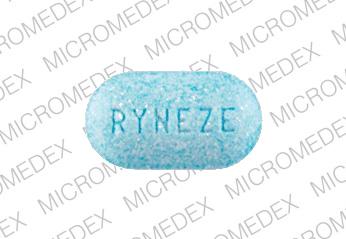Ryneze Interactions
There are 391 drugs known to interact with Ryneze (chlorpheniramine / methscopolamine), along with 21 disease interactions, and 2 alcohol/food interactions. Of the total drug interactions, 11 are major, 361 are moderate, and 19 are minor.
- View all 391 medications that may interact with Ryneze
- View Ryneze alcohol/food interactions (2)
- View Ryneze disease interactions (21)
Most frequently checked interactions
View interaction reports for Ryneze (chlorpheniramine / methscopolamine) and the medicines listed below.
- Celexa (citalopram)
- cephalexin
- codeine / promethazine
- doxycycline
- Elavil (amitriptyline)
- Flagyl (metronidazole)
- Floxin (ofloxacin)
- griseofulvin
- Januvia (sitagliptin)
- Keflex (cephalexin)
- Levaquin (levofloxacin)
- Levsin (hyoscyamine)
- Macrobid (nitrofurantoin)
- magnesium citrate
- magnesium hydroxide
- methylprednisolone
- Mobic (meloxicam)
- morphine
- NegGram (nalidixic acid)
- Norco (acetaminophen / hydrocodone)
- Norpramin (desipramine)
- Novocain (procaine)
- papaverine
- penicillin v potassium
- Phenergan (promethazine)
- phenobarbital
- scopolamine
- Zomig (zolmitriptan)
Ryneze alcohol/food interactions
There are 2 alcohol/food interactions with Ryneze (chlorpheniramine / methscopolamine).
Ryneze disease interactions
There are 21 disease interactions with Ryneze (chlorpheniramine / methscopolamine) which include:
- autonomic neuropathy
- GI obstruction
- glaucoma
- obstructive uropathy
- reactive airway diseases
- myasthenia gravis
- infectious diarrhea
- cardiac disease
- tachycardia
- anticholinergic effects
- asthma/COPD
- cardiovascular
- renal/liver disease
- coronary artery disease
- gastric ulcer
- gastroesophageal reflux
- ulcerative colitis
- hypertension
- hyperthyroidism
- diarrhea
- fever
More about Ryneze (chlorpheniramine / methscopolamine)
- Compare alternatives
- Drug images
- Side effects
- Dosage information
- Drug class: upper respiratory combinations
Related treatment guides
Drug Interaction Classification
| Highly clinically significant. Avoid combinations; the risk of the interaction outweighs the benefit. | |
| Moderately clinically significant. Usually avoid combinations; use it only under special circumstances. | |
| Minimally clinically significant. Minimize risk; assess risk and consider an alternative drug, take steps to circumvent the interaction risk and/or institute a monitoring plan. | |
| No interaction information available. |
See also:
Further information
Always consult your healthcare provider to ensure the information displayed on this page applies to your personal circumstances.


